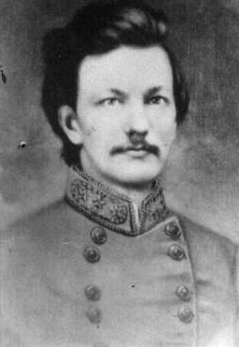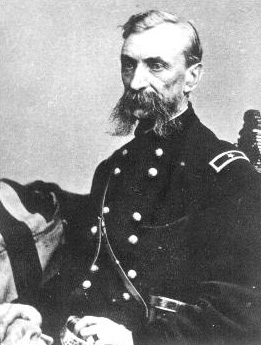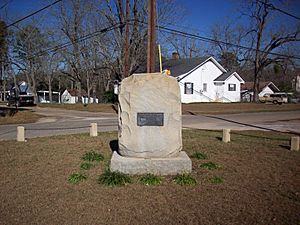Joseph G. Sanders facts for kids
Quick facts for kids
Joseph G. Sanders
|
|
|---|---|
| Born | 1828 |
| Died | Circa 1866 (aged 37–38) DeKalb County, Georgia |
| Allegiance | |
| Service/ |
|
| Years of service | 1861–64 (CSA) 1864–65 (USA) |
| Rank | |
| Unit | |
| Battles/wars | CSA: - Seven Days Battle - Second Battle of Bull Run - Battle of Antietam - Battle of Gettysburg USA: - Battle of Newton (Alabama) |
| Other work | Millwright |
Joseph G. Sanders was a soldier from Alabama who served as an officer in both the Confederate (Southern) and Union (Northern) armies during the U.S. Civil War. This was very unusual, as officers rarely switched sides once the war had begun.
Sanders first joined the 31st Georgia Infantry Regiment in 1861 as a private. A year later, he was chosen to be a captain in Company C. He fought for the South until he left his role in January 1864, saying he was sick.
After returning home to Alabama, Sanders joined the 1st Regiment of Florida Cavalry (U.S.). He was given a temporary role as a Second Lieutenant.
Sanders became known as a "bushwhacker" (a guerrilla fighter). He caused trouble for local Southern civilians, even his own neighbors. They accused him of stealing their horses and other things. This went against the rules of war.
In early 1865, Sanders was sent on a mission to recruit soldiers in Florida. But he did not follow his orders. Instead, he spent four months hiding in a swamp. On March 14, he attacked the town of Newton in southern Alabama.
Local militiamen defeated Sanders. He returned to the Union lines. He managed to avoid a court-martial (a military trial). He was allowed to leave his role, even though his general called him "grossly negligent" and "incompetent."
Later, Sanders was involved in a conflict where a citizen of Newton was killed. Sanders then fled to DeKalb County, Georgia. It is said that the victim's father found him there and killed him.
Contents
Early Life and Joining the Army
Before the Civil War, Joseph Sanders worked as a millwright (someone who builds or repairs mills) in rural Dale County, Alabama. His neighbors seemed to like him.
When the Civil War started, he joined Company C of the 31st Georgia Infantry. This happened on October 9, 1861. He first signed up for twelve months.
On April 13, 1862, he signed up again for "two years, or the war." By then, he was a Third Sergeant. He received a $50 bonus and a forty-day break from duty.
Sanders' regiment was led by Colonel Clement A. Evans. Colonel Evans later played a part in Sanders leaving the Confederate army.
Confederate Service
Becoming a Captain and His Record
On May 13, 1862, Sergeant Sanders was chosen to be the captain and leader of his company. He fought in several major battles with his regiment. These included the Seven Days Battle, the Second Battle of Bull Run, and the Battle of Antietam.
At the Battle of Antietam, Sanders was wounded. He was sick for 31 days in December 1862. He returned to his unit in January 1863. He served until July 20, 1863, just after the Battle of Gettysburg.
Around this time, his health reportedly got worse. He asked for and received a medical break to go home to Dale County. This was approved on October 9.
Leaving the Confederate Army
When Sanders returned to Alabama, he started building a gristmill (a mill for grinding grain). His neighbors were happy about this because there were not many mills in their area.
So, they wrote a petition to Jefferson Davis, the president of the Confederacy. They asked that Sanders be allowed to leave his role as an officer and stay home.
They said he was "patriotic and loyal." They also said that "only his ill health and shattered constitution" kept him from his army unit. Thirty-two citizens signed the petition. This included Daniel Carmichael, a local judge.
Captain Sanders' request to leave was sent to his commander, Colonel Evans. Colonel Evans agreed that he should be allowed to leave. Generals Jubal Early and Richard S. Ewell also agreed. Sanders officially left the Confederate army on January 29, 1864.
Federal Service
Switching Sides
No one knows exactly why, but Joseph Sanders decided to join the Union army. He also chose to become an officer for them.
On July 5, 1864, he was given a temporary role as a Second Lieutenant. He was ordered to join Company F of the First Florida Cavalry (US). He reported for duty on August 23 at Barrancas, Florida. He signed up for three years.
Sanders' Union army records say he joined "from civil life." They do not mention his past service with the Confederates. Local stories say that before he joined the Union, Sanders was about to be forced back into the Southern army.
They also say he had already become the leader of a group of deserters and Union supporters. This group had started causing trouble for citizens in lower Alabama. Many of these people had been his friends and neighbors.
Jesse Carmichael, a local citizen, wrote that Sanders "was known to be a brave man." He added that Sanders' frequent visits to the county were "very much dreaded."
Attack on Newton
Sanders' time with the 1st Florida Cavalry seemed to go well until February 25, 1865. On that day, he was ordered to take twenty men to Santa Rosa Island. His mission was to recruit new soldiers and take cattle and horses from Southern civilians. He had fourteen days to do this.
But Sanders did not follow these orders. Instead, he and his men hid in a swamp near Campbellton. They waited for a chance to attack the small town of Newton. Newton was the county seat of Dale County.
Sanders knew the courthouse there held records of his past Confederate service. He wanted to destroy them. He and his men headed for Newton on the evening of March 14, 1865.
However, their movement was noticed. The citizens of Newton were warned. Jesse Carmichael, a veteran who had lost a hand in battle, quickly organized the local Home Guard. He planned to stop his former neighbor.
Captain Joseph Breare, the Home Guard commander, tried to lead the town's defense. But Carmichael did not follow his orders. Instead, Carmichael and nine friends positioned themselves east of the courthouse square.
They ambushed Sanders and his troop as they rode into town. The ten Newtonians fired at them from the front and behind in the dark. This scared Sanders' men so much that they quickly rode out of town and into the night.
The courthouse at Newton was saved. This event was not very important in the overall war. But Carmichael and his men could still say they had defeated a Union group four times their size.
Returning to Pensacola and Leaving the Army
Sanders was absent without leave (AWOL) for four months. He returned to Pensacola in June 1865 with only eight men. He was accused of leaving the Federal Army, which was a serious offense. He was also accused of being a "terror to the people of west Florida" with his "armed gang of deserters."
When asked to explain, Sanders said he had sore feet. He also claimed his troops were sick. He mentioned an enemy force of "700 Rebels" and rising floodwaters. He said these things kept him from returning on time. Investigators could not prove he was lying, so they cleared him.
On July 20, 1865, Joseph Sanders left his role in the U.S. Army. He said he was worried about his family's safety in Dale County. His superiors approved his request to leave, just as they had when he left the Confederate army.
Sanders' resignation became official on September 13, 1865. He was discharged "for the good of the service." Brigadier General Asboth, his commander, called him "grossly negligent" and "incompetent" in his final recommendation.
Later Life and Death
After the war, Joseph Sanders returned to Dale County. Some local citizens, including a man named George Echol, tried to arrest Sanders at his home. Sanders had warned them not to try this. He shot and killed Echol, and the group trying to arrest him left.
Sanders then fled to Decatur County, Georgia. He built a mill there and seemed to have escaped his enemies. However, he was later killed there sometime after the war. It is believed that Echol's father, another judge from Dale County, was responsible.
See also
- Frank Crawford Armstrong - A Confederate General who led a Federal unit at the First Battle of Bull Run, then switched sides to fight for the South.
 | Mary Eliza Mahoney |
 | Susie King Taylor |
 | Ida Gray |
 | Eliza Ann Grier |




